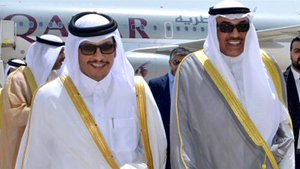Kuwait, Jul 4: Qatar has delivered its response to a list of 13 demands from Saudi Arabia and three other Arab countries that cut have ties with it and imposed a land, air and sea embargo amid a major diplomatic crisis.

Mohammed bin Abdulrahman Al Thani, Qatar's foreign minister, was received by Kuwait's Emir Sheikh Sabah Al Ahmad Al Sabah on Monday to hand over a letter from Qatar's emir, according to state-run Kuwait News Agency.
Kuwait is mediating in the dispute. The content of the letter has not been released.
Qatar's response will be the focus of a gathering in the Egyptian capital of Cairo on Wednesday of foreign ministers from the four blockading countries: Saudi Arabia, Egypt, Bahrain and the United Arab Emirates.
Al Jazeera's Saad al-Saeedi, reporting from Kuwait City, said there was "a sense of relief, tinged with caution" in Kuwait.
"Qatar's response to the demands was handed to the emir, followed by an extensive meeting between the Qatari foreign minister and his Kuwaiti counterpart for more than one and half hours. After that, the Qatari foreign minister headed to the emir of Kuwait's residence to attend another meeting over lunch before his departure," he said.
"The meetings reflect Kuwait's intense activity at the highest levels, from the emir down. Some sources suggest that the Kuwaiti foreign minister will join the four countries meeting in Cairo on Wednesday," Saeedi added.
"It is clear that a breakthrough is being achieved; that some of the demands could be addressed."
'Different strategy required'
The four countries severed diplomatic ties with Qatar and imposed sanctions on it on June 5, accusing it of supporting "terrorism". The allegation has been rejected by Doha as "baseless".
After more than two weeks, the four countries gave Doha 10 days, or until Sunday night, to comply with a 13-point demand list in exchange for the end of the anti-Qatar measures.
The demands included that Qatar shut down the Al Jazeera Media Network, close a Turkish military base and scale down ties with Iran.
Sultan Barakat, director of the Centre for Conflict and Humanitarian Studies at the Doha Institute, said it had become clear that the initial action by the Saudi-led group had not been effective.
"The fact that most international capitals have not supported the move is a very good indication to Saudi Arabia and UAE that a different strategy is now required," he told Al Jazeera.
"The best way forward is to go back to the Gulf council and tackle the issue from within the arrangement and framework that exists."
Qatar's foreign minister has already said that Doha would not meet the demands, saying the list "was meant to be rejected".
Speaking on Saturday, the foreign minister said Doha offered instead "a proper condition for a dialogue" to resolve the Gulf crisis.
US President Donald Trump spoke separately with leaders of Qatar, Saudi Arabia and Abu Dhabi late on Sunday.
He "underscored that unity in the region is critical to accomplishing the Riyadh summit's goals of defeating terrorism and promoting regional stability", the White House said.








Comments
Add new comment